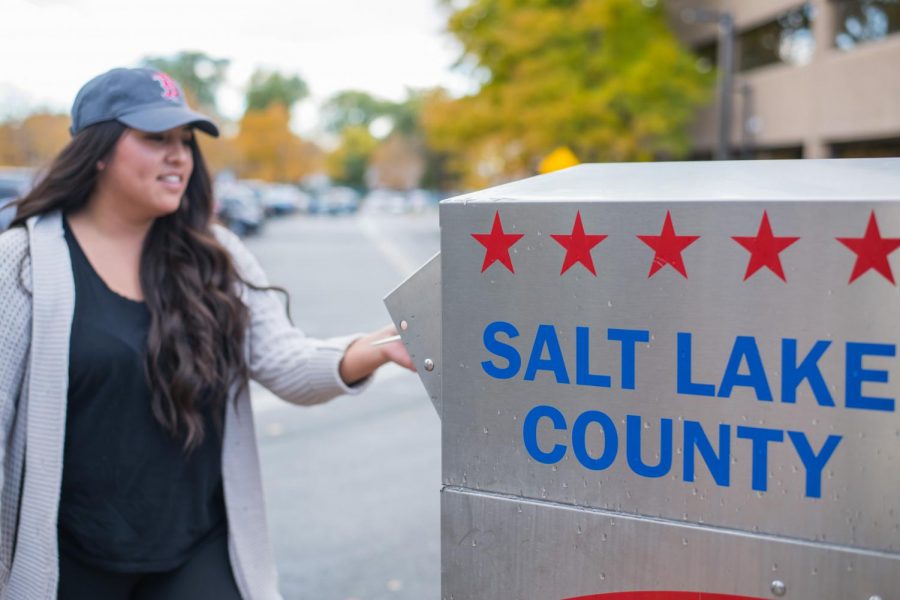Barron: You Have Toilet Paper, But Are You Prepared to Vote by Mail?
People casting their votes during the Midterm Elections 2018 at the Salt Lake County Building in Salt Lake City, UT on Tuesday, Oct. 23, 2018. (Photo by Curtis Lin | Daily Utah Chronicle)
March 28, 2020
In Utah, the impact of the coronavirus has already been felt in almost every aspect of our lives, from grocery shopping to attending school. As we adjust to sparse shelves and online classes, it is also important to identify potential effects this pandemic may have in the upcoming months to minimize the virus’ disruption in our lives, communities and country.
Primary elections have been postponed across the country over coronavirus fears, but postponing the 2020 election is unlikely. Moving an election is possible. However, legislation must be passed mandating the change, something almost impossible to accomplish in the current political climate. And even if this legislation is passed, there is little flexibility in choosing a new date. The United States Constitution specifically mandates that the new Congress must be sworn in on Jan. 3 and that the new president’s term must begin on Jan. 20. Since COVID-19 is likely to impact our election, it is important for Utahns to prepare to vote by mail in November.
Even if in-person voting occurs in November, physical ability and access will keep some voters away from polling locations. In-person polling leads to larger-than-recommended gatherings, possibly putting those most likely to be affected by COVID-19 — older Utahns and those with underlying health conditions — at risk while waiting to cast their vote. Notoriously long voting lines may be made longer if poll volunteers, typically older Americans, decide to stay home. While calls for a national vote-by-mail system grow, Utah already sends mail-in ballots to eligible registered voters automatically. Since voting in Utah does not have to rely on in-person polling, turnout can remain strong despite the virus.
During the 2018 midterms, polling places were packed despite most counties sending mail-in ballots to registered voters. Indeed, only about half of the ballots sent out for that election were returned. While more Utahns have voted since counties began implementing the vote-by-mail system, the 2018’s swamped polls may indicate that some registered Utah voters are not receiving their ballot.
This past February, I received a previous resident’s ballot for the presidential primary in my Peterson Heritage Center mailbox. Mail-in ballots are sent to the address on file for a voter — typically the address on their driver’s license or state ID — so failing to update the address after moving means the voter won’t receive their ballot at the correct address. This specifically impacts students who move residences every year and even students who hastily left dorms and apartments due to COVID-19 earlier this month.
Luckily, updating your address can be done while practicing social distancing and self-quarantining. If you have a current Utah driver’s license or state ID, click here to change your address. To receive your ballot, you must update your address a week prior to the election.
Sadly, four out of 10 Utahns are not registered to vote. Utah does allow for Election Day voter registration, but it must be done at in-person polling stations. Online registration must be completed at least a week prior to an election and mail-in registration must be completed at least 30 days prior to an election. Registration is quick — it can be done between online lectures and the “anxious scroll,” all while practicing social distancing and self-quarantining. If you have a current Utah driver’s license or state ID, click here to register to vote online. If not, click here to find the mail-in voter registration form.
Emergency preparedness has dominated the national conversation over the past couple of weeks, but emergency preparedness is not just about food storage or hoarding toilet paper. Scientists disagree on how long the coronavirus will continue to affect our everyday lives, but elected officials can have a direct impact on your life for up to six years. The legislation passed or supported by these representatives could help curb the effects of COVID-19 or establish funds to provide relief during future pandemics. Utahns are lucky enough to have a vote-by-mail system already in place, but we still need to ensure we are prepared to vote in November despite the coronavirus.
Editor’s note: Signs and symptoms of COVID-19 include fever, dry cough, tiredness and shortness of breath. These symptoms are believed to occur between two and 14 days after a person is exposed to the disease. If you have these symptoms and have recently come into contact with a person who is known to have COVID-19, or if you have recently traveled to an area with community spread of the disease, you should call your doctor. Areas with community spread of COVID-19 are believed to include China, South Korea, Italy, Iran and Seattle. If you do not have a doctor who you visit regularly, please call the Utah Coronavirus Information Line at 1-800-456-7707 or the University of Utah Health hotline at 801-587-0712. Do not go to a healthcare facility without first making arrangements to do so.








